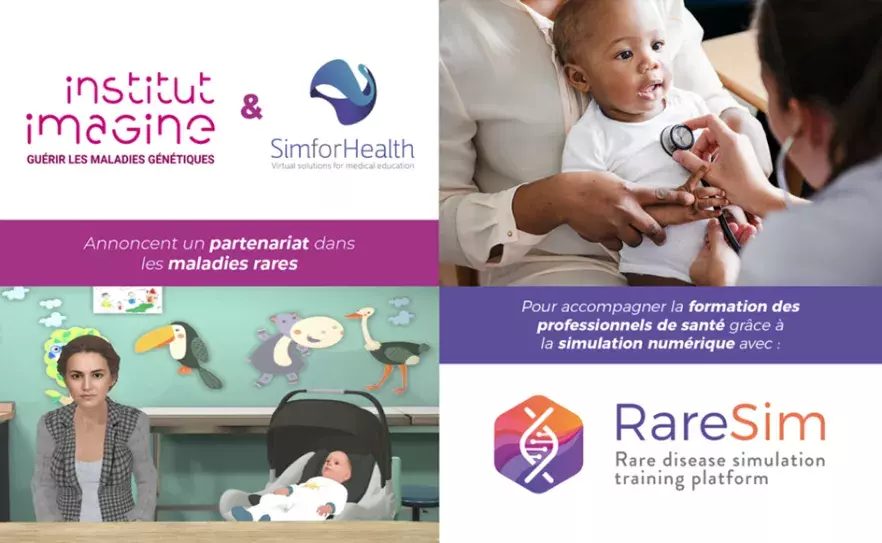Published on
A sharing of medical, educational and technological expertise
Following the official launch on September 21 of the "RareSim" digital simulation platform, whose objective is to enable the deployment of pedagogical and scientific content for information or education purposes in order to raise awareness of rare diseases among the non-specialized medical network, the strategic partnership between Institut Imagine and SimforHealth aims to enable the specialists of Institut Imagine to share their expertise with the greatest number of people.
With more than 8,000 diseases and 3 million patients affected in France, raising awareness of rare genetic diseases among healthcare professionals is a major public health issue. This is why it is important that the players involved in this ecosystem join forces and implement innovative solutions.
The launch of "RareSim" aims to facilitate access to information for healthcare professionals, with the desire to contribute to the reduction of diagnostic delays and thus improve access to care, and more generally to address the often complex issues of care for these patients.
Rely on the expertise and excellence of Institut Imagine
Institut Imagine, created by six founding members - AP-HP, Inserm, Université Paris Cité, AFM-Telethon, the Fondation des Hôpitaux and the Paris City Hall - has been involved since the platform was launched.
"On average, the time between the first symptoms of a rare disease and a diagnosis is 18 months, but this wandering sometimes lasts for years. Rare genetic diseases, which are very numerous and sometimes affect only a handful of people, are poorly known, and some are even totally unknown to doctors, as they are discovered through new generation genetic diagnostic tests. Only half of the patients referred to us have a name on their file", explains Prof. Stanislas Lyonnet, Director of Institut Imagine.
The content of the simulator was created by healthcare professionals who are sensitive to the proposed educational approach and involved in the field of rare diseases.
"The involvement of experts who, every day, take care of patients with rare diseases, in the design of these digital simulation tools is crucial for the SimforHealth team and for the partners who support this initiative", underlines Emmanuelle Gouot, Scientific Coordination Manager at SimforHealth.
For this 1st simulator "Weird head, skull shape anomaly: what to do and when?", it is the impulse of Pr Roman Hossein Khonsari, Maxillofacial and pediatric plastic surgeon at the Necker-Enfants malades AP-HP Hospital (CRMR MAFACE & CRANIOST - Filière de Santé Maladies Rares TETECOU) that allowed the creation of the authors' team. Dr Giovanna Paternoster, Neurosurgeon at Necker-Enfants malades AP-HP Hospital, and head of the Reference Center for Rare Diseases CRANIOST Coordinator, as well as Dr Samer Haber, Plastic Surgeon at Necker-Enfants malades AP-HP Hospital, were involved in the creation of the scientific and pedagogical content.
Based on concrete and realistic patient cases imagined by these doctors, these first simulators are intended to share the expertise of professionals on specific cases of virtual patients, and more generally to maintain the curiosity essential to health professionals to limit diagnostic wandering, often devastating for patients.
The ambition of "RareSim" is therefore to offer any health professional the possibility to get information free of charge when and where he wants. The "RareSim" platform is available on computers and tablets 24/7.
Supporting care providers in all specialties
"RareSim" is a collaborative and scalable platform.
The partnership between Institut Imagine and SimforHealth will allow for a progressive enrichment of the "RareSim" platform with new digital simulators dedicated to the training of the specialized medical network in hospitals and private practices, based on medical content designed by experts.
Our common ambition is that for each new simulator, the involvement of health professionals from expert centers, patient associations, and any actor involved in the field of rare diseases, will eventually make it possible to spread the messages of all 23 rare disease health networks.

